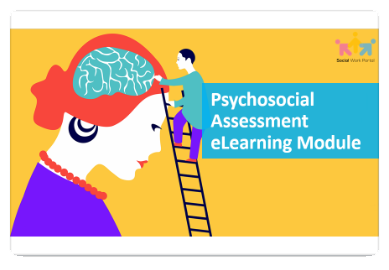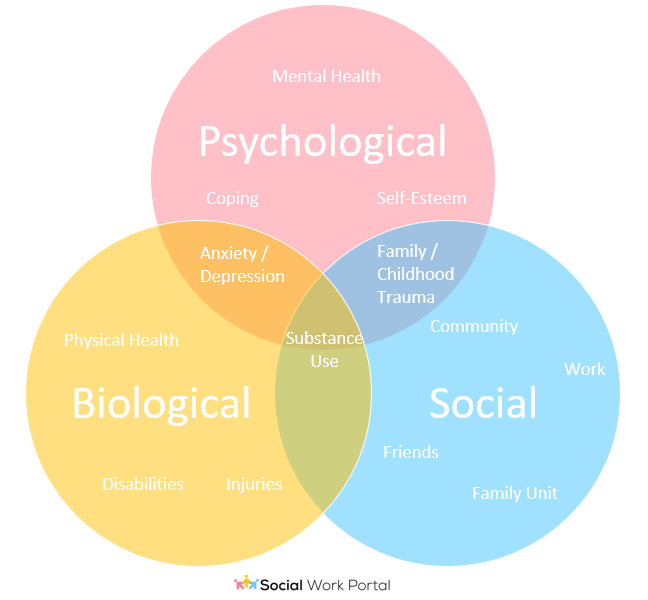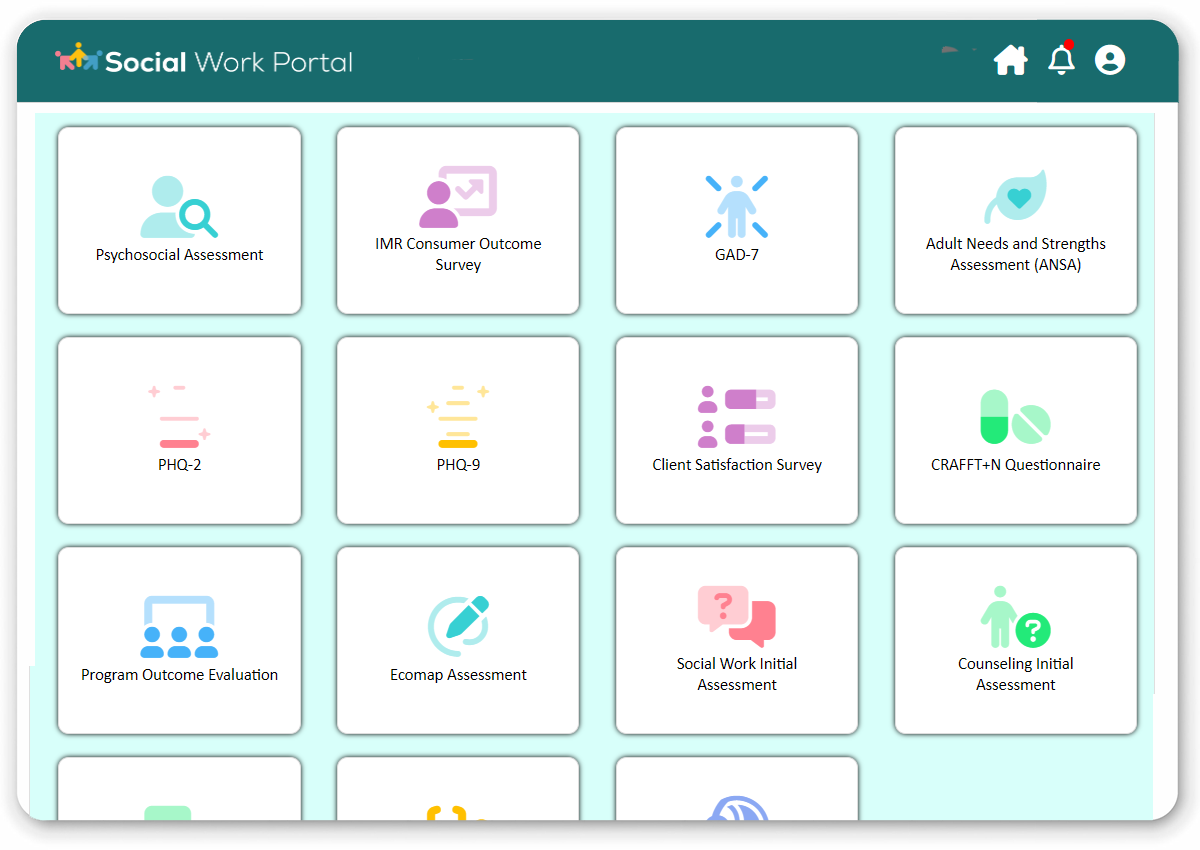Examples and Samples of Psychosocial Assessments for Social Workers
Top 2024 Guide: Psychosocial Questions & Examples of Psychosocial Evaluation
In this article, we’ll be providing helpful social work biopsychosocial assessment example cases and going through a brief overview of psychosocial interventions in mental health and how they’re used.
If you’ve been looking for a psychosocial history example, a psychosocial evaluation example, or details on best practices for writing a psychosocial assessment, then you’ll want to read on for all that and more.

Social Worker Psychosocial Assessment Social Work
One of the tools that social workers and therapists use to plan the most effective treatment plan for a client is a psychosocial assessment. This holistic review of a person’s life can uncover connections between the physical, mental, and social.
A psychosocial history example is often used for long-term intervention plans, where it’s important to look at all aspects of an individual’s environment and influences.
The psychosocial approach in social work helps ensure that a clinician has all important information pertaining to why an individual may be suffering from a certain condition or experiencing various problems. Psychosocial assessment questions are typically asked during a clinical interview process.
See Also: Everything You Need to Know About Using the CRAFFT Questionnaire
Table of Contents: Psychosocial Interventions & Assessments
Keep on scrolling down this page to read each section or click any link below to go directly to that section.
- What Is a Psychosocial Assessment?
- What’s the Difference Between a Biopsychosocial and Psychosocial Assessment Social Work Practitioners Do?
- What Are Examples of Biopsychosocial Assessments Factors?
- Questions to Ask in a Psychosocial Assessment Social Work Evaluation
- Psychosocial Assessment Example Cases for Social Workers
- What Are Examples of Psychosocial Interventions?
- Free Downloadable Psychosocial Assessment Example Template
- Conclusion | Examples of Biopsychosocial Assessments
- FAQ | Psychosocial Assessment Social Work
Don’t Miss: CPT Codes for Mental Health & Therapy
What Is a Psychosocial Assessment?
A case management psychosocial assessment is an assessment of three key areas of influence in a person’s life – physical, mental/emotional, and social. This is an extensive history designed to capture multiple data points that can inform a treatment plan.
Psychosocial theory in social work promotes the benefit of looking at a person holistically, which can’t be done if a clinician is only focused on their mental health, but not social influences or physical health.
A psychosocial questionnaire can be fairly brief and given along with new patient paperwork to highlight any key information that may need to be known, such as childhood trauma or past injury.
A psychosocial health assessment can also be very detailed and include multiple questions across all areas of a person’s life. Some clinicians will tailor an assessment of psychosocial needs according to a client’s issue or situation. For example, if someone is presenting with a potential drug abuse problem, the social worker may include psychosocial assessment questions that delve deeper into that area.
Related: Alcohol & CAGE-AID for Alcohol & Drug Use Screening
Do you have any questions about a psychosocial assessment example social work practitioners use or how to do evaluation psychosocial interventions? If so, contact the Social Work Portal Team.
What’s the Difference Between a Biopsychosocial and Psychosocial Assessment Social Work Practitioners Do?
When researching psychosocial assessment in mental health you’ll likely run across both psychosocial and biopsychosocial references. You may have wondered what the difference is between a patient psychosocial assessment and social work biopsychosocial assessment.
Nowadays, these two terms are used interchangeably, however, there was initially a difference between the two.
Initially, a psychosocial assessment social work example consisted of combining a psychological assessment and a social assessment, hence the term “psychosocial.”
 |
Get Social Work eLearning Videos Subscribe to the All-in-One Case Management Hub today and go to My Library! |
Then, the social work biopsychosocial assessment example came along and added the third component, which was biological or physical health. Researchers realized that it was an important “third leg of the stool” along with mental well-being and social influences that contributed to a person’s overall mental health.
Over the years, the psychosocial therapy meaning has morphed to also include the biological component along with the social and psychological. So, when you are searching online for a psychosocial behavioral assessment, you are likely to find it termed either biopsychosocial or psychosocial.
Popular Article: What Are the Best Screening Tools for Depression and Anxiety?
What Are Examples of Biopsychosocial Assessments Factors?
Here are some of the factors that are gathered in a psychosocial support questionnaire.
Biological
- General physical health
- Current illnesses
- Past illnesses of note
- Current injuries
- Past injuries of note
- Disabilities or challenges
- Medications being taken
- Medications taken in the past
Psychological
- General mental health
- Coping mechanisms
- Current issues or challenges (anxiety, depression, etc.)
- Self-esteem
- Self-control
- Mood
- Past mental health history
Social
- Family unit (current)
- Family unit as a child
- Past family trauma
- Past abuse/neglect
- Circle of friends
- Hobbies/interests
- Work status
- Community associations (church, support agencies, etc.)

The three factors of psychosocial theory in social work influence each other, and thus looking at them holistically helps inform the best patient outcomes.
Read More: What Is the PHQ 4 Questionnaire for Depression & Anxiety?
Do you have any questions about a psychosocial evaluation or a psychosocial assessment example social work teams use? If so, contact the Social Work Portal Team.
Questions to Ask in a Psychosocial Assessment Social Work Evaluation
When following the psychosocial approach in social work, you’ll be asking questions about both current situations and past experiences. It’s helpful to have the psychosocial questions divided into the three key areas of mental health, physical health, and social influences.
Following, are examples of some typical psychosocial questions for adults.
Typical Psychosocial History Questions
- Describe your family growing up.
- Did you have any traditions that you followed?
- Describe any cultural values or traditions you grew up with.
- Have you ever experienced any traumatic experiences?
- Describe any traumatic events in your past.
- Have you ever had any significant physical injuries or illnesses?
- Describe your general health as a child and young adult.
- Do you have any history of drug or alcohol abuse?
- Have you ever used drugs or alcohol to avoid feeling a certain way?
- Do you have any history of mental health problems?
- Have you ever been treated for a mental health issue, even a small one?
- Have you ever been to a counselor or therapist?
- List any medications that you’ve taken for more than a month.
|
Client Management Software – Assessment Templates, Case Notes & More Start using All-in-One Case Management Hub Platform today |
|
Psychosocial Assessment Questions for Current Factors
- What is currently your biggest challenge?
- Describe your family unit.
- What cultural or religious traditions do you uphold?
- Are you currently experiencing any problems at home?
- Are you employed?
- Describe your recent work history.
- Describe the people in your social circle.
- How is your physical health?
- Describe any health issues you are experiencing.
- List any medications that you are taking.
- When was your last physical checkup?
- How often do you use nicotine?
- How often do you use alcohol and/or non-prescription medications or illegal drugs?
- Are you currently experiencing any mental health challenges?
- Are you seeing any mental health providers (counselor, therapist, etc.)?
- Describe how you feel about yourself.
- If you could change a trait about yourself, what would that be?
- Do you have any problems with mood control?
Related: Depression Questionnaire and Scoring Guide
Do you have any questions about psychosocial evaluation, a psychosocial history example, or a social work biopsychosocial assessment example? If so, contact the Social Work Portal Team.
Psychosocial Assessment Example Cases for Social Workers
What does a filled-out psychosocial questionnaire look like?
If you’d like a full psychosocial assessment to send to clients, then you’ll want to sign up for a free trial of our Client & Case Management Software. Send assessment forms online through an encrypted and secure client portal or print them out to use offline.
Below, we’ve put together a couple of social work biopsychosocial assessment examples. Note, these are just brief examples of evaluation psychosocial assessments for educational purposes and are based on fictitious patients.
Psychosocial Assessment Example #1
| Family History: | Divorced, the mother is out of the picture. He is a single dad. |
| Social Circle: | Has close friends from his former job. |
| Education: | High school graduate, culinary school (2 years) |
| Substance Use: | None |
| Current Health: | Good |
| Past Health History: | No major illnesses or injuries. |
| Employment History: | Employed in the food industry last 16 years. Was laid off due to the pandemic, and was on unemployment, but it ran out. |
| Skills: | Extensive experience in restaurants working as a chef. |
| Leisure Activities: | Being a dad, working in the garden |
| Motivations: | Making a good life for kids |
| Criminal History: | None |
| Current Mental Health: | Excessive worry about finances. |
| Past Mental Health: | Took anxiety medications as a child. |
 |
More Tools. Better Experience.
x Client management software designed especially for social workers. |
Psychosocial Assessment Example #2
| Family History: | Had to leave home at 15 due to a toxic environment, stays in touch with his brother |
| Social Circle: | Current social circle is not a good influence, they are also struggling with addiction. |
| Education: | 2 years of high school, would like to get his GED |
| Substance Use: | Frequent for the last four years |
| Current Health: | Not eating properly, constant drug use is taking a toll |
| Past Health History: | No major illnesses, but was injured a lot as a kid due to abuse. |
| Employment History: | Infrequent jobs as a carpenter in the construction industry |
| Skills: | Working in construction, is “good with computers” |
| Leisure Activities: | Skateboarding, gaming |
| Motivations: | Wants to live a better life and break free of his addiction so he can have a life like his brother (happy, productive) |
| Criminal History: | Has been in jail twice for disorderly conduct in public places, and was released both times |
| Current Mental Health: | Has been in a crisis situation without adequate support since he was 15; has very low self-esteem |
| Past Mental Trauma: | Abusive relationship with his father and his mother was not around when he was young |
Don’t Miss: What Tools Can You Use to Test for Anxiety or Depression?
What Are Examples of Psychosocial Interventions?
When taking a holistic psychosocial approach in social work, the treatment and interventions identified should also holistically address the whole person. Just like the physical, mental, and social areas of a person’s life can have a negative influence on each other, the same is true of positive influences.
Some examples of psychosocial interventions to improve a person’s well-being and mental health are:
- Psychotherapy
- Cognitive behavioral therapy
- Family or group therapy
- Assertive Community Treatment
- Nutrition and wellness programs
- Medication
- Therapeutic art or music therapy
- Animal-assisted therapy
- Coping techniques
- Physical therapy to address physical symptoms
- Vocational rehabilitation
Popular Article: How Does the PHQ 9 Depression Scale Work?
Free Downloadable Psychosocial Assessment Example Template
The Social Work Portal offers a free psychosocial evaluation template that you can download and use for your practice. This template for the assessment of psychosocial needs is easily edited in Microsoft Word or a compatible program.
Click below to sign up for a free trial and download a free psychosocial assessment template.
Once you’ve signed up for your trial, visit ‘My Free Tools’ in the menu.
See Also: What You Need to Know about The GAD 7 Anxiety Test
Do you have any questions about the psychosocial theory in social work or about any of the psychosocial assessment example social work cases in this article? If so, contact the Social Work Portal Team.
Conclusion | Examples of Biopsychosocial Assessments
Psychosocial interventions and psychosocial assessments are cornerstones of mental health services. A psychosocial evaluation can help clinicians get a universal view of a person’s entire well-being and the key elements that impact it.
Reviewing examples of biopsychosocial assessments can help you get a better understanding of the types of information collected and how it all connects. Using a psychosocial approach in social work helps practitioners ensure they are looking holistically at a person in full and enables more robust treatment plans.
Don’t Miss: Guide for Health Care Workers
FAQ | Psychosocial Assessment Social Work
What is a psychosocial assessment?
A case management psychosocial assessment is an assessment of three key areas of influence in a person’s life – physical, mental/emotional, and social. This is an extensive history designed to capture multiple data points that can inform a treatment plan.
What are examples of biopsychosocial assessments?
Here are some of the factors that are gathered in a psychosocial support questionnaire.
•General physical health
•Past physical health
•Disabilities or challenges
•Medications being taken
•General mental health
•Coping mechanisms
•Current issues or challenges
•Past mental health history
•Family unit (current)
•Family unit as a child
•Past family trauma
•Circle of friends
•Work status
•Community associations
What are the three levels of biopsychological analysis?
The three levels of biopsychological assessment are:
•Biological (physical well-being)
•Psychological (mental well-being)
•Social (family, friends, community)
What are examples of psychosocial interventions?
Some examples of psychosocial interventions to improve a person’s well-being and mental health are:
•Psychotherapy
•Cognitive behavioral therapy
•Family or group therapy
•Assertive Community Treatment
•Nutrition and wellness programs
•Medication
•Therapeutic art or music therapy
•Animal-assisted therapy
•Coping techniques
•Physical therapy to address physical symptoms
•Vocational rehabilitation
Note: Content on Social Works socialworkportal.com website is copyrighted.
Social Work Portal Disclaimer:
Social Work Portal is not a social work agency and we do not refer social workers. This web site is provided for educational and informational purposes only and does not constitute providing medical advice or professional services. The information provided should not be used for diagnosing or treating a health problem or disease, and those seeking personal medical advice should consult with ...
Read our full disclaimer here: Social Work Portal Disclaimer.
Image sources: Stock.adobe.com







